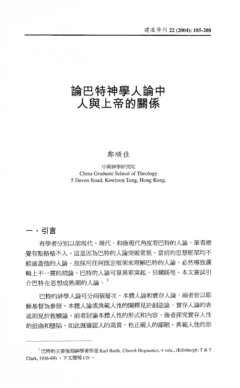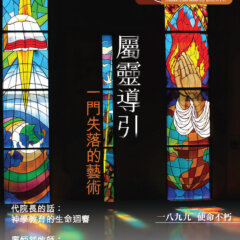論巴特神學人論中人與上帝的關係性/鄭順佳
撮要
巴特反對現代性的自主自我,他對康德的超驗進路背後的前設,即人內具本然核證啟示的能力,甚不以為然;巴特對士萊馬赫把上帝簡約成遙不可及的宗教感受,亦不敢苟同;對黑格爾把上帝的作為賦予必然性,也無從認可。但是,巴特卻盛讚祈克果的上帝作為全然的祂者。巴特宣告必須從上帝啟示的道理解人性。他雖然肯定經驗科學的貢獻,卻認為它們所關注的,是人的現象和可能,而非人的存有本身。
對巴特來說,神學人類學的核心是「人是上帝的被造物和立約的伙伴。」他採取歷史具體的進路,因為人的身分是從參與耶穌基督的歷史而來。神學人類學必須建基於基督論,而非倒過來。巴特成熟期的神學人論是「動態 – 關係性」的,從位格性關係去理解。他認為真實的人是會遇中的人、是與上帝和他人立約的人。就形式而言,人是從上帝而來,朝向上帝,及與上帝一起;就質料而論:(1)人是上帝的道所召喚和傾聽者;(2)人的存有是歷史;(3)人是感恩的存有;(4)人是主動負責任的存有。正因人由上帝命定,人才是自由的,因為人得到了釋放,能真正的自我命定。
可見巴特神學人論中人與上帝的關係,是以基督論為中心,以立約為脈絡,藉層級性的對話 – 辯證模態來理解的。
ABSTRACT
Barth is against the autonomous self of modernity. He regards an innate ability to validate revelation an illegitimate presupposition inherent in Kant’s transcendental approach. He disagrees with Schleiermacher who reduces God to an intangible postulate of religious feeling. He finds fault with Hegel’s argument that all the acts of his God are necessitated by dialectic. He finds Kierkegaard’s God as Wholly Other much to commend. Barth asserts that one must comprehend human nature from the revealed Word of God. He would not overestimate the contribution of empirical sciences, for these disciplines are concerned only with human phenomena or possibilities, not with the being of humanity itself.
For Barth, the core of theological anthropology is that “humanity is the creature and covenantal partner of God.” His approach is historically concrete, as human identity comes from participation in the history of Jesus Christ. Theological anthropology is built upon Christology, and not vice versa. His mature theological anthropology is dynamic-relational, interpreted in terms of interpersonal relations. For him, authentic humanity is persons in encounter, persons in relation to God and to fellow humans. Formally speaking, humans are from, to and with God. Materially speaking, humans are (1) being as called by and hearing the Word of God, (2) being as history, (3) being in gratitude, and (4) actively responsible being. Humans are free because they are determined by God and thus they are liberated and can genuinely be self-determining.
Hence Barth’s theological anthropology on humanity’s relationality with God is Christological-based, situated within a covenantal context, and is understood in terms of a hierarchical dialogical-dialectical mode.
原載於《建道學刊》22期(2004年7月),頁185-208。
最新文章
【代院長的話】神學教育的生命迴響 / 高銘謙
2024 年 10 月 1 日
建道通訊217期
2024 年 10 月 1 日
【屬靈導引】屬靈導引—一門失落的藝術 / 董智敏
2024 年 10 月 1 日
编辑精选
從梧州到長洲:建道神學院125年的挑戰與恩典 / 陳智衡
2023 年 10 月 1 日
微小教會的見證/高銘謙
2023 年 6 月 1 日







